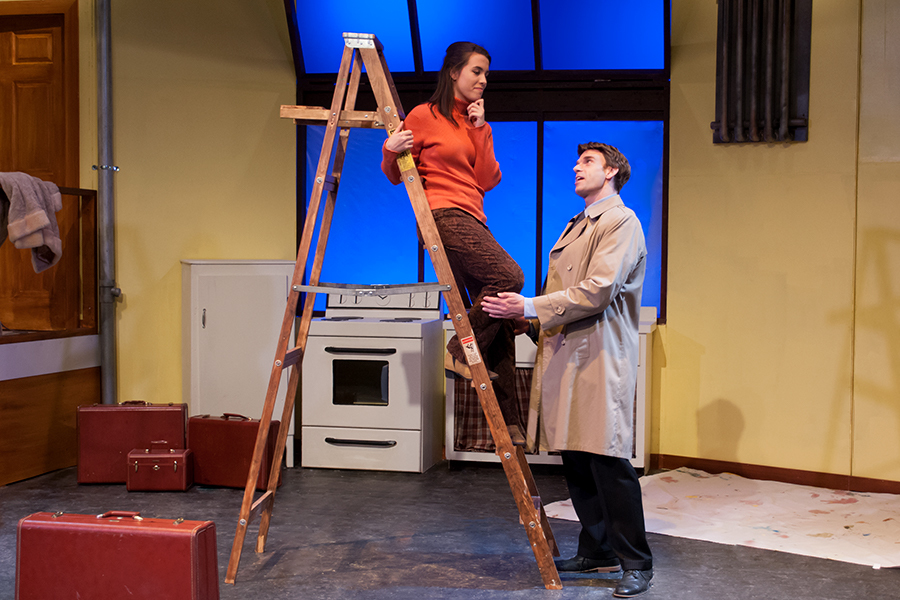Review: BAREFOOT IN THE PARK at Theatre Tallahassee

Barefoot in the Park: Love and Conflict on the 5th Floor
How can a marriage go from newlywed infatuation to conflicted misery in just four days? The viewer finds out in Theatre Tallahassee's production of Neil Simon's "Barefoot in the Park."
The music of the 1960s wafts throughout the auditorium as the audience assembles at Theatre Tallahassee for "Barefoot in the Park," setting the stage through sound for the show's time setting: 1963.
This Neil Simon play chronicles the lives of newlyweds Corie and Paul Bratter (played by Taylor Filaroski and Jeff Hoh) as they transition into their day-to-day life following a luxurious honeymoon week at The Plaza.
Day-to-day life is the opposite of The Plaza: five flights of stairs to ascend with every coming and going; a radiator that doesn't work (presenting a problem in February); cramped accommodations; a hole in the skylight and a mix of neighbors stretching the definition of normal.
There isn't much that says 1960s like a princess phone and a landline. When Telephone Man Harry Pepper (Nardge J. François) delivers the Bratters' phone, the audience gets the first inkling of the fact that Corie may be in over her enthusiastic head.
Corie's mother, Ethel (Debbie Frost) visits as Corie awaits delivery of furniture and struggles not to pop Corie's dreamy newlywed bubble while skeptically assessing her choices of paint color and trying to recover from the arduous walk up the stairs. Frost's Ethel is witty, sharp-tongued, and evolving; the performance is one of the show's standouts.
Paul Bratter's first look at his new home occurs when he slogs up the stairs after work. Paul's tunnel-focus on his work as an attorney is at odds with Corie's excitement about the new abode and her disregard for the potential pitfalls of a five-floor walk up with so many oddities and imperfections.
The Corie-Paul relationship hits its stride more thoroughly later in the show during the second act of the show, when Paul breaks out of his buttoned-up attorney persona. He's a funny drunk with excellent comedic timing, and shifts into a nuanced portrayal of a husband straddling love and confusion as the consequences of Corie's impetuousness grow.
It's hard for the audience not to like Corie, though, even when her attempts to engineer outcomes lead to problems and conflict.
The set's rendering of the Bratters' skylight serves both as a point of focus and as a symbol. Audience members can interpret the symbol however they choose, but at a time in history on the cusp of great historical change, it could represent the fragility of trying to stay protected from swirling outside forces.
Paul and Corie's neighbor, Victor Velasco (Duncan Hoehn), is what no newlywed wants: he uses their apartment as egress to his own (through the bedroom window and across a ledge visible through the skylight -- one of the more amusing and visually arresting parts of the show). He doesn't mind his own business. He has a romantic interest in Ethel (thanks in part to Corie's hand in getting them to the same dinner).
That dinner, a double date between Paul and Corie and Victor and Ethel, is a turning point. The audience doesn't see the dinner, but the aftereffects are clear.
The dinner surfaces the difference Corie observes between Paul and her: some people are "watchers" and some are "doers." Probably a distinction better sorted out before saying "I do," but leaves the couple "wanting a divorce before the marriage license has been issued."
Will Paul learn to embrace Corie's spontaneity by walking barefoot in the park, literally and/or figuratively? As he grapples with the decision the audience sees Corie become a bit more insightful and Paul a hair more willing to experiment.
Maybe he had time to decide about embracing that spontaneity on all those walks up and down the stairs.
The show is Michelle Nickens' directorial debut.
For more information, visit Theatre Tallahassee.
Photo credit: Abby Kinch
Reader Reviews

Videos
